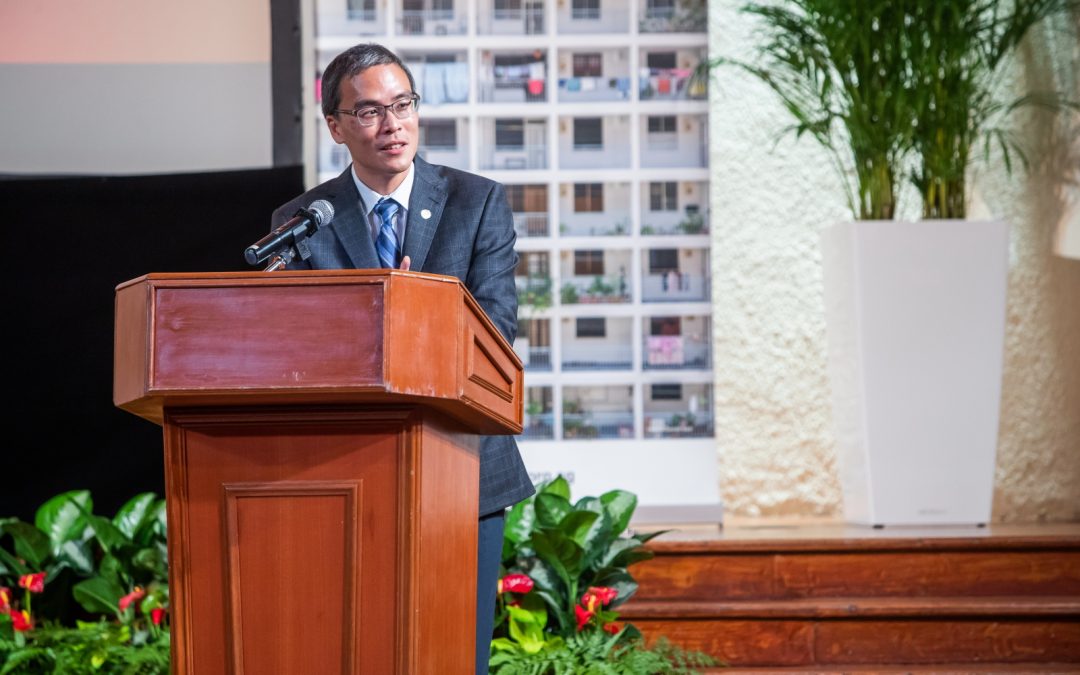Speech by Chairman Laurence Lien at CFS’s 10th anniversary celebrations


Thank you all for joining us in this celebration.
CFS was first incorporated on 8 September 2008; hence our 10th birthday celebrations now. Lehman Brother collapsed on 15 September 2008, so we are also commemorating 10 years of the Global Financial Crisis.
I spoke of how we were born in bad times at our Chinese New Year luncheon in March. I will not repeat what I said, except to emphasise again how difficult it was to start up. It was difficult to hire, because we were a start-up doing something novel here. Donors didn’t want to talk to us. And there were even people in the sector who did not want us to exist, as they saw us as competition for funds.
Surviving those early days was a minor miracle. I was there at the start so I have my war stories. Frankly, before I became the CEO of NVPC in 2008, the first job that then Chairman of NVPC, Stanley Tan, offered me was not the NVPC one, but to be the first CEO of CFS. I rejected it, and took the NVPC one instead. But little did I know that after the first six months, I was to do both jobs, and became the acting CEO for nearly four years.
So there we were at the start helping donors give strategically, bridging them with charities, providing donor advice, grantmaking expertise and back end administration. What we still do today.
Writing a cheque is not difficult at all; but giving well is. In my years at NVPC, I kept hearing from people that they wanted to give, but did not know how. They didn’t know where the social needs were, or how to assess charities and programmes. So we helped them, cut out the hassle and thereby increasing the joy of giving.
But being a good idea is not enough. People had to believe that we could do what we said we would. We spent the best of our first five years just building credibility. And 10 years on, I am very proud of what we have built.
Catherine has already mentioned the numbers. Let me just include two more. One, at least three of our donors have gone on to form their own foundations. This to me is a sign that we have helped these donors learn and mature, and we can let them go on to do greater things. Two, when we conducted a comprehensive ‘Donor and Grantee Perception Survey’ a few years back, we had very high donor satisfaction ratings – with 83% satisfaction rates and 93% saying that they would recommend CFS services to others. But satisfaction among our grantee charities was even better: 94% rated CFS as efficient and effective. This shows that we are able to be close to the charities and help them bridge effectively to our donors.
As someone who has been so actively involved in the growing CFS, I am extremely proud of what we have achieved in these 10 years.
To come this far, there are many people I would like to thank, especially those who were there during our early years:
- Our first Chairman Stanley Tan who not only was the architect and founding chair of CFS for its first five years till 22 Aug 2013, but he was also single-handedly responsible for bringing in the first $15 million in pledges.
- The other founding board members – J Y Pillay, David Lim, Mary Ann Tsao, Kwek Siew Jin. As a young start-up, donors would typically ask who is on the board. When we mention J Y Pillay, they would immediately say, okay, I know I can trust you.
- All staff who have helped make CFS’s first 1,000 days, without whom, we could not possibly be successful I would like to single out two amongst us today. Yvonne Yu who joined us in January 2009 and Joyce Teo who joined us in March 2009.
- All our donors, particularly our founding donors who gave us a chance like Stanley Tan and MILK Fund, William and Mary Bird, Simon Cheong and UBS. We also have in our midst Yeoh Keng Joon, Vivien Goh, Changi Airport Group, Ascendas-Singbridge and the family of former President S R Nathan, who have all been strong supporters of CFS for many years. In fact, Mr Nathan officially launched CFS in February 2009, and subsequently trusted us with his S R Nathan Education Upliftment Fund which is now over $10 million in size and has helped over 1000 students.
- Our international advisory council members – Clare Brooks, Eileen Heisman, Anne Boyd and Bob Edgar. These people had so much experience, and they were incredibly generous to give us time to share and guide us. Whenever we had a difficult question, we would shoot it to one of them, and we would almost always get a detailed and insightful reply within 24 hours. They were simply amazing.
And the many others who came along and played their invaluable role in making us the success that we are today. Thank you all of you. This has truly been a community effort, and I am privileged to have been part of that journey.
What would the next 10 years look like for CFS? Moving forward, I believe there is still much work there needs to be done. I think CFS has only reached out to a small fraction of our addressable market. CFS has grown rapidly, but the number of people with significant means and who want to give strategically have increased substantially.
What is my own vision for CFS in 2028?
One, that we be at the forefront of community philanthropy, that we build this sense that the many communities in Singapore can come together to solve our own problems, without always looking to the government. I hope that in 2028, we will see mini community foundations in our neighbourhoods, in places like Toa Payoh, Queenstown and Punggol.
Two, that we have democratised giving. Giving is not only for the rich; everyone should and can give. I hope to see young adults start donor advised funds with us, at smaller amounts of commitment, and our collective funds grow with widespread contributions.
Three, I hope to see CFS raise $1 billion in donor funds, maybe not in 10 years’ time, but at some point in the future. I believe we are at an inflection point. As we grow legacy giving, we are planting seeds for growth that will bear fruit in the future. I hope to encourage Singaporeans to give when we are alive and able to enjoy giving.
But this is my own vision. Over the next few months, we will be transitioning to a new chair. We already know who the new chair is but will announce only a little later. So the new chair, together with the board, will develop and own the vision for the next 10 years. I can only step back and cheer them on.
All I know is this. CFS has come so far. Moving forward, CFS is well-positioned to continue to grow from strength to strength. We count on you present today, to continue journeying with us, to grow this community of givers. We all are part owners of CFS because we are all the part of the Singapore community. Be engaged. Broaden and deepen our community. Give more. And invite me back in 2028.
Thank you.
Laurence Lien
Chairman
Community Foundation of Singapore
Thank you all for joining us in this celebration.
CFS was first incorporated on 8 September 2008; hence our 10th birthday celebrations now. Lehman Brother collapsed on 15 September 2008, so we are also commemorating 10 years of the Global Financial Crisis.
I spoke of how we were born in bad times at our Chinese New Year luncheon in March. I will not repeat what I said, except to emphasise again how difficult it was to start up. It was difficult to hire, because we were a start-up doing something novel here. Donors didn’t want to talk to us. And there were even people in the sector who did not want us to exist, as they saw us as competition for funds.
Surviving those early days was a minor miracle. I was there at the start so I have my war stories. Frankly, before I became the CEO of NVPC in 2008, the first job that then Chairman of NVPC, Stanley Tan, offered me was not the NVPC one, but to be the first CEO of CFS. I rejected it, and took the NVPC one instead. But little did I know that after the first six months, I was to do both jobs, and became the acting CEO for nearly four years.
So there we were at the start helping donors give strategically, bridging them with charities, providing donor advice, grantmaking expertise and back end administration. What we still do today.
Writing a cheque is not difficult at all; but giving well is. In my years at NVPC, I kept hearing from people that they wanted to give, but did not know how. They didn’t know where the social needs were, or how to assess charities and programmes. So we helped them, cut out the hassle and thereby increasing the joy of giving.
But being a good idea is not enough. People had to believe that we could do what we said we would. We spent the best of our first five years just building credibility. And 10 years on, I am very proud of what we have built.
Catherine has already mentioned the numbers. Let me just include two more. One, at least three of our donors have gone on to form their own foundations. This to me is a sign that we have helped these donors learn and mature, and we can let them go on to do greater things. Two, when we conducted a comprehensive ‘Donor and Grantee Perception Survey’ a few years back, we had very high donor satisfaction ratings – with 83% satisfaction rates and 93% saying that they would recommend CFS services to others. But satisfaction among our grantee charities was even better: 94% rated CFS as efficient and effective. This shows that we are able to be close to the charities and help them bridge effectively to our donors.
As someone who has been so actively involved in the growing CFS, I am extremely proud of what we have achieved in these 10 years.
To come this far, there are many people I would like to thank, especially those who were there during our early years:
- Our first Chairman Stanley Tan who not only was the architect and founding chair of CFS for its first five years till 22 Aug 2013, but he was also single-handedly responsible for bringing in the first $15 million in pledges.
- The other founding board members – J Y Pillay, David Lim, Mary Ann Tsao, Kwek Siew Jin. As a young start-up, donors would typically ask who is on the board. When we mention J Y Pillay, they would immediately say, okay, I know I can trust you.
- All staff who have helped make CFS’s first 1,000 days, without whom, we could not possibly be successful I would like to single out two amongst us today. Yvonne Yu who joined us in January 2009 and Joyce Teo who joined us in March 2009.
- All our donors, particularly our founding donors who gave us a chance like Stanley Tan and MILK Fund, William and Mary Bird, Simon Cheong and UBS. We also have in our midst Yeoh Keng Joon, Vivien Goh, Changi Airport Group, Ascendas-Singbridge and the family of former President S R Nathan, who have all been strong supporters of CFS for many years. In fact, Mr Nathan officially launched CFS in February 2009, and subsequently trusted us with his S R Nathan Education Upliftment Fund which is now over $10 million in size and has helped over 1000 students.
- Our international advisory council members – Clare Brooks, Eileen Heisman, Anne Boyd and Bob Edgar. These people had so much experience, and they were incredibly generous to give us time to share and guide us. Whenever we had a difficult question, we would shoot it to one of them, and we would almost always get a detailed and insightful reply within 24 hours. They were simply amazing.
And the many others who came along and played their invaluable role in making us the success that we are today. Thank you all of you. This has truly been a community effort, and I am privileged to have been part of that journey.
What would the next 10 years look like for CFS? Moving forward, I believe there is still much work there needs to be done. I think CFS has only reached out to a small fraction of our addressable market. CFS has grown rapidly, but the number of people with significant means and who want to give strategically have increased substantially.
What is my own vision for CFS in 2028?
One, that we be at the forefront of community philanthropy, that we build this sense that the many communities in Singapore can come together to solve our own problems, without always looking to the government. I hope that in 2028, we will see mini community foundations in our neighbourhoods, in places like Toa Payoh, Queenstown and Punggol.
Two, that we have democratised giving. Giving is not only for the rich; everyone should and can give. I hope to see young adults start donor advised funds with us, at smaller amounts of commitment, and our collective funds grow with widespread contributions.
Three, I hope to see CFS raise $1 billion in donor funds, maybe not in 10 years’ time, but at some point in the future. I believe we are at an inflection point. As we grow legacy giving, we are planting seeds for growth that will bear fruit in the future. I hope to encourage Singaporeans to give when we are alive and able to enjoy giving.
But this is my own vision. Over the next few months, we will be transitioning to a new chair. We already know who the new chair is but will announce only a little later. So the new chair, together with the board, will develop and own the vision for the next 10 years. I can only step back and cheer them on.
All I know is this. CFS has come so far. Moving forward, CFS is well-positioned to continue to grow from strength to strength. We count on you present today, to continue journeying with us, to grow this community of givers. We all are part owners of CFS because we are all the part of the Singapore community. Be engaged. Broaden and deepen our community. Give more. And invite me back in 2028.
Thank you.
Laurence Lien
Chairman
Community Foundation of Singapore
- Related Topics For You: CHARITY STORIES, DONOR STORIES, DONOR-ADVISED FUND, EVENTS, NEWS, OPINION, STORIES OF IMPACT



